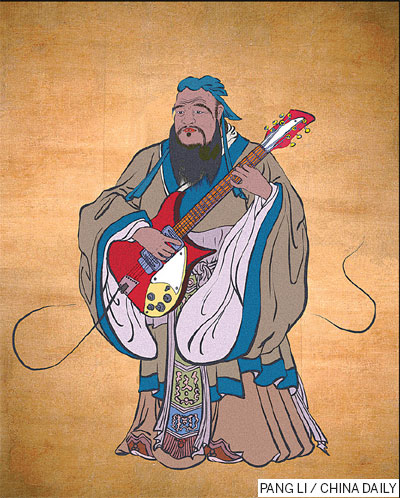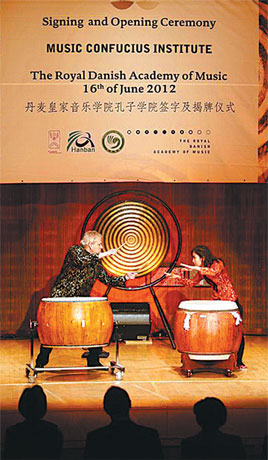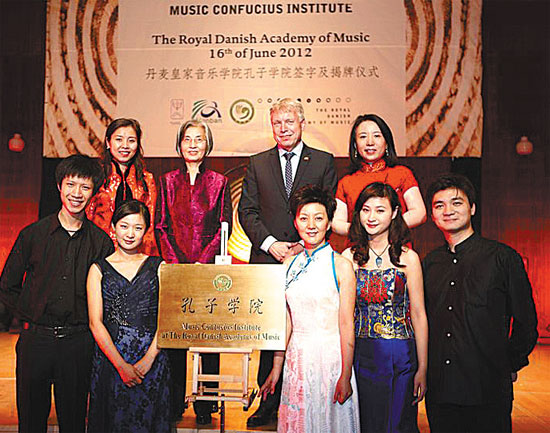Let the music play
Updated: 2012-12-28 07:40
By Mu Qian (China Daily)
|
|||||||||||

Music is a universal language and it is one of the ways to learn about another culture. To spread the teaching of Chinese music to the world, the Confucius Institute has set up the first Music Confucius Institute in Copenhagen. Mu Qian reports.
In the Chinese classic Analects, philosopher Confucius (551-479 BC) says "to educate somebody, you should start from poems, emphasize ceremonies, and finish with music".
After some 2,500 years, China is executing Confucius' idea through the Music Confucius Institute, which aims at teaching and promoting Chinese musical art in the world.
Co-founded by Hanban/Confucius Institute Headquarters and Royal Danish Academy of Music, and with China's Central Conservatory of Music (CCOM) as the Chinese partner, the first Music Confucius Institute was inaugurated in Copenhagen in June.
"The Music Confucius Institute marks the new effort of the Confucius Institute in the arts field," said Guo Shulan, Party secretary of the Central Conservatory of Music and director of the council of Music Confucius Institute, at the institute's recent first board meeting in Beijing.
"It is also a good opportunity for the Central Conservatory of Music and Royal Danish Academy of Music to expand their visions and enhance the diversity of world music cultures."
According to Guo, Music Confucius Institute's work mainly comprises of teaching, performance, research and promotion of Chinese music.
From 2013, students at the Danish academy will be able to take credit courses of Chinese music performance and theory. Chinese percussionist Qiao Jiajia, who will travel to Copenhagen in January, will serve as the Music Confucius Institute's deputy director and first Chinese teacher. The institute will also provide general courses about Chinese music for local students of primary, secondary and high schools.
|
The delegation from Central Conservatory of Music at the opening ceremony of the Music Confucius Institute in Copenhagen. Photos provided to China Daily |
In terms of performances, the institute will hold concerts for students to practice what they learn in the classrooms, and invite Chinese musicians to conduct workshops. It also plans to bring high-level Chinese musicians to tour and perform in Denmark.
"The Central Conservatory of Music will take this opportunity to introduce the best of traditional and contemporary Chinese musical works to the world," Guo says.
In Spring 2013, musicians from both schools will form a Music Confucius Institute troupe and hold a series of concerts and other music events in Denmark and another European countries.
At the concerts, the Danish students will perform Chinese works such as the piano solo Autumn Moon on Calm Lake. Chinese musicians will perform both traditional Chinese works such as Dragon Boat and Horse Race, and Danish music works like Jacob Gade's Jalousie "Tango Tzigane". Musicians from both countries will collaborate to perform a Chinese percussion work Bull Fighting Tiger.
Before each concert, there will be a lecture of 30 minutes about the history and tradition of Chinese music, given by Zhang Boyu, a CCOM professor of musicology who used to study in Denmark.
"Seen from our perspective, the Central Conservatory of Music is exceptional as it has strong departments for both Western classical music and traditional Chinese music. I'm sure we can benefit from cooperating with both departments and pave the way for very interesting interactions between those different music cultures," says the Danish academy's rector Bertel Krarup.
"I feel sure that we can make Music Confucius Institute a very important cultural exchange platform and a window for us foreigners to better understand modern China."
The Music Confucius Institute is the second Confucius Institute in Copenhagen and the third in Denmark.
Under Hanban (The Office of Chinese Language Council International), an executive body affiliated to China's Ministry of Education, Confucius Institute is devoted to enhancing the world's understanding of Chinese language and culture.
China established the first Confucius Institute in Seoul in 2004, drawing from the experiences of other countries in disseminating their native languages.
By January 2012, China has established 358 Confucius Institutes and 500 Confucius Classrooms, located in 105 countries and regions of the world.
"The Confucius Institute began to introduce Chinese language and culture to the world eight years ago, and has laid a good foundation for us to promote Chinese music," says professor Liu Yuening, director of the Music Confucius Institute office at CCOM. "I think Music Confucius Institute is one of the best platforms for promoting Chinese music."
In the past, the cultural products that China sent out were mostly acrobatics and Peking Opera, but Liu believes that after a few decades of promotion, foreign audiences are willing and ready to learn more about Chinese culture, especially music.
"From my own experience, I feel that people in many different countries want to know more about Chinese culture, through which they will understand more deeply the country," says Liu, who is a well-known yangqin (Chinese dulcimer) musician and used to be a visiting scholar at the Ferenc Liszt Academy of Music in Hungary and University of Delhi in India.
"Because music is a global language, it is easy for people from around the world to accept it."
Krarup says that both the Danish and Chinese sides must be aware of the different cultures and traditions, so that they can collaborate with each other in the long term.
"All of us have great expectations for Music Confucius Institute, and I'm sure we will all try to make it a big and lasting success," he says.
Contact the writer at muqian@chinadaily.com.cn.
|
Gert Mortensen from Denmark and Qiao Jiajia from China collaborate to perform a Chinese percussion work Bull Fighting Tiger at the ceremony. Photos provided to China Daily |
(China Daily 12/28/2012 page18)
Today's Top News
President Xi confident in recovery from quake
H7N9 update: 104 cases, 21 deaths
Telecom workers restore links
Coal mine blast kills 18 in Jilin
Intl scholarship puts China on the map
More bird flu patients discharged
Gold loses sheen, but still a safe bet
US 'turns blind eye to human rights'
Hot Topics
Lunar probe , China growth forecasts, Emission rules get tougher, China seen through 'colored lens', International board,
Editor's Picks

|

|

|

|

|

|







